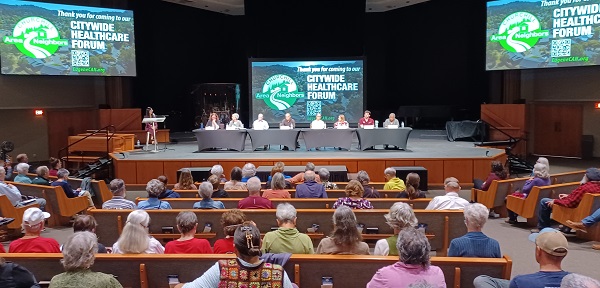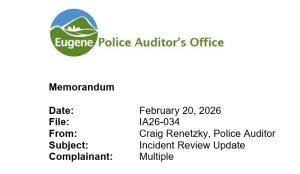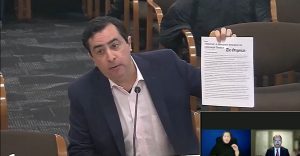CAN organizer goes behind the scenes at the citywide health care forum
8 min read
Presenter: The Neighborhood Leaders Council heard a behind-the-scenes account of one of the most ambitious and newsworthy neighborhood forums of all time, broadcast live from the Willamette Christian Center last September. Representing Churchill Area Neighbors (CAN) July 22, NLC co-Chair Jensina Hawkins:
[00:00:19] Jensina Hawkins (Churchill Area Neighbors): We put on the citywide health care forum on Thursday, Sept. 26. This was the brainchild of Councilor Randy Groves. He came to (CAN Chair) Sarah (Zoll) and me at CAN and said, “What if you guys do a health care forum? I went to one at Salem. It was pretty cool. You could probably get some folks from the legislature to come and talk.”
[00:00:38] Presenter: Last fall, the city was reeling from the closure of Eugene’s only hospital, followed by new corporate ownership of Oregon Medical Group (OMG), which many said contributed to a sudden shortage of primary care physicians. Everyone was talking about health care. Jensina Hawkins:
[00:00:55] Jensina Hawkins (Churchill Area Neighbors): So we started the health care forum meetings. We met every week leading up to this.
[00:01:02] We went with Willamette Christian Center, because it’s in our neighborhood and because we were really, really, really wanting to drive attendance and have a place that’s somewhat centrally located in our neighborhood, has bus access, has parking, has the technical capabilities, and a whole bunch of other things that are a lot of other places within our neighborhood we wouldn’t have been able to get all together in one place.
[00:01:25] The first budget item that we had to figure out what we were going to do, how we were going to raise the money for the venue, that is $300 an hour. The forum we planned for two hours, and one hour to set up and one hour to tear down.
[00:01:37] At one point, somebody possibly got a really great idea saying ‘Why don’t we make it citywide?’ And then it just like became an entirely different animal from there.
[00:01:49] What was fun about it was that none of us had ever done anything like it ever before. So we made it all up as we went along. We didn’t have a playbook. We didn’t have really any really great ideas of how to do it.
[00:02:01] We kept track of all the different tasks that we had to do, like designing the event programs. We would provide updates on the sponsorships that we collected, the publicity—who’s going to push out to which different bodies— Eugene Health Care Coalition ended up becoming very, very active in this.
[00:02:18] And then we always, in the meeting agenda, we would track down every single last moment of the itinerary, as far as the agenda of what was going to happen, who’s going to do what.
[00:02:29] But Randy Groves was super supportive the entire way through. He attended almost all of our committee planning meetings. He made a lot of email introductions for folks, and he let me very shamelessly drop his name everywhere.
[00:02:44] We decided to have it on a Thursday evening. Sarah from CAN is our chair, very rigorously checked all of the school and college sports schedules to make sure there was no football or anything else going on that evening.
[00:02:58] Presenter: After selecting the date and the place for their event, they began inviting speakers. Jensina Hawkins:
[00:03:05] Jensina Hawkins (Churchill Area Neighbors): I invited eight just to see if somebody couldn’t make it and all eight accepted.
[00:03:09] The first was Rep. Nancy Nathanson and then we got DeLeesa, DeLeesa Meeshintubby, who is the director of Volunteers in Medicine, who connected us with James McGovern, who was the chief hospital executive.
[00:03:22] Then Dr. (Nick) Jones is actually in the CAN neighborhood. He’s a direct primary care provider and very passionate about political activism.
[00:03:32] Eve Gray is the Lane County Health and Human Services director; Julie Fahey is speaker of the House; and we got Dr. Capp from Optum Oregon who just took over OMG.
[00:03:43] And I have to give that man a lot of credit because he had to have known what he was walking into and he still showed up anyway, he showed his face and was a pretty decent human being for the whole thing.
[00:03:53] Presenter: After deciding on the who, what, when and where, they launched their publicity blitz, in hopes of making the citywide forum as inclusive and impactful as possible. Jensina Hawkins:
[00:04:05] Jensina Hawkins (Churchill Area Neighbors): One person on our CAN board had a connection with KLCC, so we did an interview there.
[00:04:10] We didn’t get signs until about two weeks prior to and so we put signs everywhere. One of them was next to the University District Hospital that had just closed. A KEZI reporter happened to be down there, they were doing a piece on eight months since University District closed. He saw the sign for the health care forum, reached out and said, ‘Is anybody willing to talk to me?’ So we got a lot of traction that way.
[00:04:34] So we did a whole lot of just pounding the streets and walking around and trying to introduce ourselves. I’ve leveraged a lot of my connections through some of the stuff that I’ve done, the Police Commission, I had some contacts at Register-Guard, so I invited all of them.
[00:04:51] I googled how to do press releases and how to reach out to different media stations and pretty much just saturated the area.
[00:04:59] And then the evening of the event, actually, a KVAL reporter plugged in his camera and his audio directly into the soundboard of Willamette Christian Center, so that he could have a direct feed. And then about every 15 or 30 minutes, he would step out into the lobby and do a teaser on KVAL. So we were able to get some traction there as well.
[00:05:17] Presenter: Jensina said the topic drew many sponsors from Eugene’s political leaders.
[00:05:22] Jensina Hawkins (Churchill Area Neighbors): I did cold reach-outs to a lot of politicians and said, ‘You don’t know who I am, but you probably should because this is what we’re doing now.’
[00:05:29] I also shamelessly dropped my husband’s name. He’s the president of the Lane County NAACP, and so I told a lot of my emails, I said, ‘I’m Mrs. Demond Hawkins,’ because they don’t know who on earth Jensina Hawkins is.
[00:05:44] I put together a bunch of ‘Meet The Panelist’ flyers and I pushed them out on social media.
[00:05:50] I also attached them on the packets. I sent invitations to absolutely every single body in town, including like the Bethel School district, 4J School District, Lane County Commissioners.
[00:06:03] Sending the invites absolutely everywhere with that shotgun approach ended up with a lot of people just randomly offering to help sponsor.
[00:06:12] Laurie Trieger was the first one, she is a county commissioner. She was the first one to jump on board and that was just from the invitation that I had said, ‘Hey guys, you want to come to this health care forum?’ And she said, ‘How can I help sponsor it?’
[00:06:22] The people who really cared were the county commissioners, the city councilor who was helping us (who suggested we do it), mayor-elect-at-the-time Kaarin Knudson. She was happy to help. Things like Emergence Addiction (and Behavioral Therapies). So Chris Wig who runs Emergence, he reached out. He saw something that I posted on Facebook and asked how Emergence could be involved.
[00:06:43] And then at the very, very end, (Lane County Commissioner) Pat Farr said, ‘Well, however much Laurie (Trieger) gave, I want to give more than her.’ So we got another $750 push from him.
[00:06:54] We did use Eugene Neighbors Inc. because we needed a place for folks to write their checks and have it be to a 501(c)(3) so they can count it as a tax write-off. So ENI had a 5% cut out of everything. And then, yeah, we ended up with $7.95 total left over, out of about $2,500.
[00:07:17] So, also in the packet, we had a thing for folks to submit a question and we created a Gmail account that Sarah and I monitored to to assimilate all the questions beforehand. What we did not want was a circus. And so we didn’t want to necessarily be running a microphone all over the crowd. We wanted folks to submit their questions beforehand so we could read them, kind of collect them.
[00:07:43] By the time this event happened, so about 4:30 p.m. when Randy and I got to the venue, we had collected about 60 questions and they were still coming in as people came in the door.
[00:07:55] Presenter: The top news story that night was the announcement that McKenzie Willamette Medical Center would build a new emergency department in Eugene. In September 2024, at the free citywide health care forum, then-CEO David Butler:
[00:08:10] David Butler: Initially we’re looking at about a 12-bed satellite ED. It would have the ability to grow and expand, based on the site that we’re looking at.
[00:08:23] So we feel that we have two really good hospitals in this community. Unfortunately, they’re both in Springfield. And even though it doesn’t take you an hour to get across town, it’s still, it’s a disadvantage to have to drive all the way over to McKenzie or RiverBend to get health care.
[00:08:42] We know there’s a lot of great urgent care centers and we appreciate that, but this would be a 24-hour, seven-day-a-week freestanding or what we call a satellite ED.
[00:08:52] Presenter: The July 2025 Neighborhood Leaders Council coincided with more headline news from McKenzie Willamette, and more publicity for Churchill Area Neighbors. Jensina Hawkins:
[00:09:04] Jensina Hawkins (Churchill Area Neighbors): Apparently it’s on the news tonight because the McKenzie Willamette CEO just got fired today, and the chief nursing officer as well.
But CAN got a lot of leverage out of that because every single photo of David Butler that gets out there, any push they do about the satellite emergency room that McKenzie Willamette’s going to be putting in in Eugene, the news are constantly using the footage from that. And that ended up being a whole lot of free advertising that has gone on now for eight or nine months.
[00:09:37] And I’m very curious to see what happens with McKenzie Willamette now that David Butler is gone. We may end up having to do another round.
[00:09:46] Presenter: For neighborhoods planning to host large forums in the future, Jensina recommended budgeting for event insurance and lots of publicity.
[00:09:54] Jensina Hawkins (Churchill Area Neighbors): We found out at the very last minute: We had to have event insurance. That was not something we had figured into our numbers at the very last minute. Sarah ended up covering that.
[00:10:03] Signs: In another perfect world, I would have a lot more signs and I would get them a lot earlier, because the week or two before the event was not nearly enough to get the recognition out that we needed.
[00:10:16] I’ve seen the building full before for other events that had a lot of advertising. It’s an 800-1,100 seat venue. We could push right up to 1,000.
[00:10:25] But we put that together in about three months, having no idea what we were doing. And it ended up, we had about 200 in the room and another 200 online that were watching. And it still has a life of its own.
[00:10:40] Presenter: Jensina Hawkins from Churchill Area Neighbors takes neighborhood leaders behind the scenes at the first free citywide health care forum. You can learn about neighborhood events at the public meetings calendar on the city’s website.





